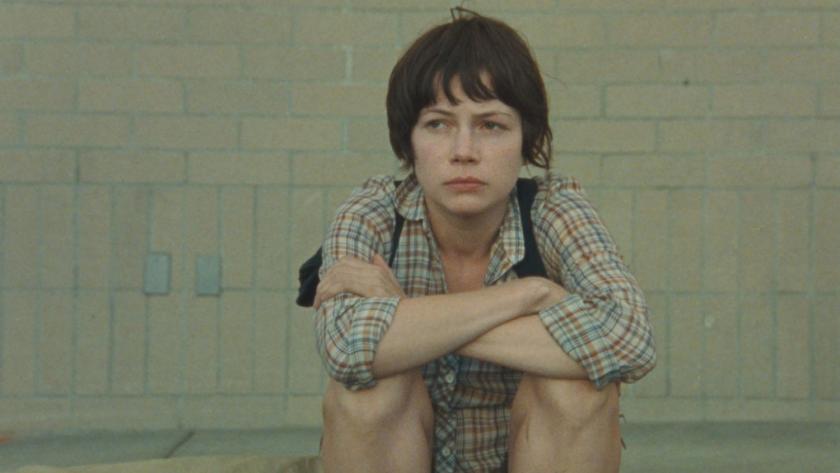Wendy and Lucy is a road movie with a protagonist who’s unable to move on, and a study of friendship where one half of the partnership is mostly absent from the screen. Originally released during the 2008 financial crisis, Kelly Reichardt’s third feature film is ripe for reissue, its depiction of life on society’s margins more relevant than ever.
We’re not told what events have prompted the central character to up sticks from her Indiana home and head north-west with her beloved dog Lucy. As played by Michelle Williams, Wendy is an unconventional runaway. She’s conventionally dressed, softly spoken and articulate, keeping tabs on her financial outgoings and carefully planning her route. She’s hoping to find work in an Alaskan cannery, sleeping on the front seat of her battered Honda each night while Lucy sprawls out in the back.
Events take a turn for the worse in a one-horse town in Oregon, Walter Dalton’s gruff-sounding security guard Walter knocking on Wendy’s car window and telling her that she can’t spend the night in a Walgreens parking lot. The car’s refusal to start is the first in a series of small but unfortunate events, each one eroding her chances of moving on. Most calamitous is her theft of two tins of dog food from a supermarket while Lucy is tied up outside. We hope that the store manager will recognise Wendy’s plight and let the matter drop, but a tenacious junior employee convinces him to press charges. Released from police custody hours later, after paying a $50 fine, Wendy returns to the shop to find that Lucy is missing.
 For a film which unfolds at such a steady pace, Wendy and Lucy is unbearably tense. The dog pound is a three-mile walk from Lucy’s immobile car, the faults undiagnosed until she can pay the $30 fee to have it towed a few metres to a nearby garage. Plus, this being 2008, she doesn’t have a smartphone. Williams is terrific as a young woman nearing breaking point, despair conveyed with the subtlest of gestures. The town is falling apart at the seams, Reichardt’s camera lingering on the boarded-up shopfronts. Hearing Will Patton’s mechanic explain in painstaking detail what’s wrong with the car is like listening to an obituary being read aloud. The sound of freight trains rumbling north makes Wendy’s enforced inertia all the more painful.
For a film which unfolds at such a steady pace, Wendy and Lucy is unbearably tense. The dog pound is a three-mile walk from Lucy’s immobile car, the faults undiagnosed until she can pay the $30 fee to have it towed a few metres to a nearby garage. Plus, this being 2008, she doesn’t have a smartphone. Williams is terrific as a young woman nearing breaking point, despair conveyed with the subtlest of gestures. The town is falling apart at the seams, Reichardt’s camera lingering on the boarded-up shopfronts. Hearing Will Patton’s mechanic explain in painstaking detail what’s wrong with the car is like listening to an obituary being read aloud. The sound of freight trains rumbling north makes Wendy’s enforced inertia all the more painful.
Walter’s kindness suggests that not all hope is lost; with his help she can call the pound to check if Lucy has been found, and his slipping her a few banknotes near the close is a sweet moment. This is a quiet marvel of a film, shot in just 20 days on a tiny budget and lasting just 80 minutes. A shout-out too to Reichardt’s own dog, her performance as Lucy impressive enough to have won her the coveted "Palm Dog" award at the 2008 Cannes Festival.















Add comment